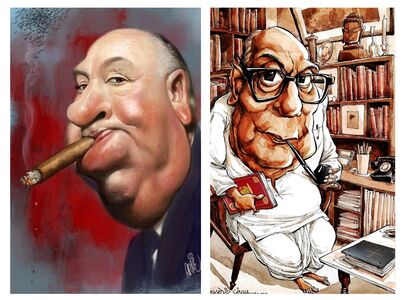My father Nirmal Chandra Kumar, the famous antiquarian and bibliophile smoked pipe and occasionally cigar. The cigar was mostly Davidoff. A Swiss premium brand of cigars.
His friend Brigadier Nambier, hailing from Kerala, whenever in town came over home to discuss with Kumar, Military Books and Army Maps. In one of these visits he presented to my father a box of Trichinopoly Cigar. My father looked at it with a frown when the Brigadier much amused blurted out: Alfred Hitchcock, Winston Churchill smoked Trichy Cigars!
Then he went on to describe the Trichy Cigar. I was in the room helping my father to roll out different Military Maps in the table and was a little taken back. Suddenly the subject turned from the Indian Mutiny Map Showing Position of Troops on 1st May 1857 to Cigars made in Trichinopoly, Tamil Nadu, South India and how Winston Churchill had a Staff posted in Madurai Custom Office, to ensure that the best of Trichy Cigars reached him in Britain.
The Trichinopoly cigar is said to be coarse and rough, but widely loved by aficionados. The tobacco used in the cigars was from the neighbouring towns of Dindigul and Karur in Tamil Nadu. Once the tobacco was procured, the makers would then ferment it in distilled fruit for years, sometimes fifteen. With jaggery and honey added to the mix in particular proportions, the cigar had a unique Indian flavour, different from their Cuban and Dominican counterparts.
The Indians who owned Trichinopoly cigar companies used British-sounding names to escape racial prejudice from their international consumers. Some popular cigar brands were John Mayer, Fenn Thompson. Fenn Thompson was founded by Solayappa Thevar in 1900, which continues to operate even today, supplying its products to England and Germany.
The cigars were a huge export item from Trichinopoly during the British colonial rule in India. The Woraiyur region in particular had about 4,000 manufacturing units at the industry’s prime. However, with high tax rates, lack of skilled labour and the advent of cheaper factory-produced cigars, the industry began to decline. Another reason for its decline was that people began to view smoking as an unhealthy habit, rather than a stylish practice.
However, the Trichinopoly cigars enjoyed such popularity worldwide that they have been featured in the works of many famous authors, like Sherlock Holmes and even an Alfred Hitchcock movie.
Trichy Cigar is mentioned in Arthur Conan Doyle’s novel A Study in Scarlet, which introduced the famous fictional detective Sherlock Holmes and his confidant and partner Dr Watson to the literary world. In this 1887 murder mystery, Sherlock Holmes describes a murder suspect to the detectives from Scotland Yard as follows, “There has been murder done, and the murderer was a man. He was more than six feet high, was in the prime of his life, had small feet for his height, wore coarse, square-toed boots and smoked a Trichinopoly cigar.”
Alfred Hitchcock’s 1938 mystery thriller film The Lady Vanishes, based on the novel The Wheel Spins by Ethel White, features actors Margaret Lockwood, Michael Redgrave and May Whitty, among others. Centred around a young tourist Iris Henderson (Margaret Lockwood) in a train looking for her fellow female passenger who goes missing, the Trichinopoly Cigar gets a mention when Gilbert Redman (Michael Redgrave) assumes the role of Sherlock Holmes and says to Iris, “And then, my dear Watson, you can have a Trichinopoly Cigar.” Hitchcock himself smoked the Trichy Cigar.
The Trichinopoly cigar is also the favourite of another famous fictional detective, Dr John Thorndyke, in novels such as The Red Thumb Mark (1907) and A Cat’s Eye (A Dr Thorndyke Mystery) (1923), written by British crime writer R Austin Freeman.
The cigar is also mentioned in the 1914 short story The Salad of Colonel Gray, written by GK Chesterton, featuring yet another detective, Father Brown. The scene involves a character who wants to buy a Trichinopoly cigar when he is in India, and a mishap that occurs when he tries to find a shop.
The detective genre’s fascination with the cigar doesn’t stop there. The cigar is also mentioned in the 1928 novel The Unpleasantness at the Bellona Club written by Dorothy L Sayers, featuring the detective Lord Peter Wimsey.
Argentinian writer Jorge Luis Borges also mentions it in his short story The Approach to Al-Mu’tasim. My father is often compared with the great bibliophile, who also smoked the Trichinopoly cigar.
In the early 1940s, Nazi Germany’s submarine fleet began to savage convoys headed across the Atlantic Ocean, carrying weapons, ordnance, food and Prime Minister Winston Churchill’s beloved Havana cigars. Faced with the prospect of Great Britain’s wartime commander being lost to nicotine withdrawals, the Madras Governor stepped in, using his special powers under the Defence of India Rules he started supplying Trichy Cigars to Winston Churchill. Later Churchill directed the appointment of a CCA , Churchill’s Cigar Assistant, an English-speaking cigar taster , who was tasked with discreetly obtaining the finest Trichinopoly cigars, and ensuring they made their way to 10 Downing Street.
Founded in 1900 by Solai Thevar, Fenn Thompson was one of several cigar manufacturers founded in present-day Tiruchirappalli by enterprising Indians who understood the power of branding. All of them were run by Indians but since they catered to the British, we needed English names said V Vasudevan, Fenn Thompson’s proprietor.
Needless to say, that my father who always liked a challenge for information, smiled at the Brigadier and both rolled out cigars from the teak wood box of John Meyer, lighted them, let out the first puff, smiled at each other and continued with their discussion on maps.
While aspects of Indian culture such as cuisine and clothing are commercialized worldwide now, the Trichinopoly cigars have been popular for centuries.

